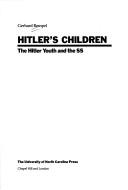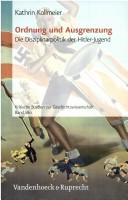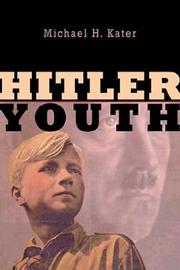| Listing 1 - 10 of 17 | << page >> |
Sort by
|
Digital
Year: 2007 Publisher: Z.p. Canvas
Abstract | Keywords | Export | Availability | Bookmark
 Loading...
Loading...Choose an application
- Reference Manager
- EndNote
- RefWorks (Direct export to RefWorks)
Kind --- Hitlerjugend --- Derde Rijk
Book
Year: 1934 Publisher: Potsdam : Voggenreiter,
Abstract | Keywords | Export | Availability | Bookmark
 Loading...
Loading...Choose an application
- Reference Manager
- EndNote
- RefWorks (Direct export to RefWorks)
Nationalsozialismus : Erziehung - Hitler-Jugend.
Geschichte. --- Quelle. --- Deutsches Jungvolk. --- Hitler-Jugend. --- Hitlerjugend --- Geschichte
Book
ISBN: 9789463106467 Year: 2024 Publisher: Kalmthout Pelckmans
Abstract | Keywords | Export | Availability | Bookmark
 Loading...
Loading...Choose an application
- Reference Manager
- EndNote
- RefWorks (Direct export to RefWorks)
Freek en Rosa. Twee kinderen in 1944, Wereldoorlog II. Hij is lid van de Hitlerjeugd. Voor hem heel normaal. Zijn opa heeft een krant die samenwerkt met de Duitsers. Zij groeit op in een gezin van verzetsstrijders. Het gaat om haar vader en grote broer. En toch ontstaat er een vriendschap tussen de twee? Een vriendschap die al snel verboden wordt. En alles wat Freek en Rosa proberen om hun vriendschap in stand te houden, Maakt de afstand tussen hen groter. Trekt hen verder uit elkaar. Tot, op het einde van de oorlog, Bij de bevrijding! Door geweld, verdriet, door dood, verraad? De vriendschap omslaat in blinde haat.Want vrijheid!Oh gij vrijheid?Gij felbevochten, vaak ontbeerdeDuur betaalde vrijheid?Gij brengt mijn vrede niet.https://www.pelckmansuitgevers.be/gij-brengt-mijn-vrede-niet.html
Wereldoorlog II --- Vriendschap --- Verzetsbeweging --- Hitlerjugend --- Verraad --- Jeugdboeken 10-12 jaar

ISBN: 0807818410 Year: 1990 Publisher: Chapel Hill University of North Carolina Press
Abstract | Keywords | Export | Availability | Bookmark
 Loading...
Loading...Choose an application
- Reference Manager
- EndNote
- RefWorks (Direct export to RefWorks)
Book
ISBN: 0874361982 0874361990 Year: 1975 Publisher: Oxford : Clio Books,
Abstract | Keywords | Export | Availability | Bookmark
 Loading...
Loading...Choose an application
- Reference Manager
- EndNote
- RefWorks (Direct export to RefWorks)
Hitler-Jugend. --- History --- Germany --- Allemagne --- Politics and government --- Politique et gouvernement --- -Germany --- -Hitler-Jugend. --- Hitler-Jugend --- Nationalsozialistische Deutsche Arbeiter-Partei. --- Hitlerjugend --- Reichsjugendführung (Germany). --- Hitler Youth --- HJ --- History. --- Weimar Republic, Germany, 1918-1933

ISBN: 9783525351581 Year: 2007 Publisher: Göttingen Vandenhoeck & Ruprecht
Abstract | Keywords | Export | Availability | Bookmark
 Loading...
Loading...Choose an application
- Reference Manager
- EndNote
- RefWorks (Direct export to RefWorks)
Discipline of children --- National socialism and children --- Children and national socialism --- Children --- Child discipline --- Punishment of children --- Child rearing --- Discipline --- Punishment --- History --- Hitler-Jugend --- Nationalsozialistische Deutsche Arbeiter-Partei. --- Hitlerjugend --- Reichsjugendführung (Germany). --- Hitler Youth --- HJ --- History.
Book
ISBN: 9783851325157 Year: 2008 Publisher: Turia und Kant
Abstract | Keywords | Export | Availability | Bookmark
 Loading...
Loading...Choose an application
- Reference Manager
- EndNote
- RefWorks (Direct export to RefWorks)
The intention of the book is to reduce the enormous Austrian research deficiency concerning the reappraisal of the sporting life during the NS-era. Therefore it will depict all sportive areas on the "Austrian" territory between March 1938 and April 1945, including top sports and sports for all, mass and minority sports, sports in clubs, youth sports and also sports practices of the formations of the NSDAP. Due to the enormous quantity of material, this overview will be contrasted by a precise analysis of three specific periods: the months after the "connection", the autumn 1939 and the period after Stalingrad. It can be shown, that and how the regime dictated the basic conditions of sports, but there can also be found some grey area, in which those who were involved found resp. created freedom by strategies of mutual adaptation. This freedom was used by different groups in specific ways: by the regime to calm down the working class or to soothe anti-Prussian resentments, by the athletes to get some privileges and by the spectators to keep a glimpse of good luck. Not instrumentalisation defined sports, but a negotiation of interests. It is just gaze on the everyday life of sports and the inherent permanent negotiations between regime and the people, that refer to the book's contribution to the long term discussion on national socialism, which exceeds the field of sports: The political and cultural system of the Nazi-era could not be understood by looking at power, competences or possibilities of the regime in comparison with the people's experiences and feelings of subjection, from which historical sciences construct the image of an interlude, which cannot be included in the evolutionary development of modernity. Looking on sports not only claryfies, to which extent cultural traditions led on and how "normality" was kept alive, but shows, in which ways changes and new valuations were obviously shared and use by the people. This concerned changing definitions of the sense of community, of gender, youth, work and performance. The special importance of sports can be found in substantiating these articulations by giving them authenticity and tracing them back to the nature of men. The analysis of sporting life in the NS-era may serve as an cause for questioning the contemporary gaze on the Nazi state. For all people, who were allowed to be included, life in national socialism offered - in spite of holocaust and World War - supply of a pleasant, self-determined and enjoyable livelihood. Who leaves aside or overlooks this facet of the Nazi dictatorship, will not be able to understand the acceptance and fascination of the regime and evoke just this often senseless metaphors of refusal, which mostly shape actual discourses.
Sports --- National socialism and sports --- History --- Sports and national socialism --- Field sports --- Pastimes --- Recreations --- Recreation --- Athletics --- Games --- Outdoor life --- Physical education and training --- Sport --- National Socialism --- Popular Culture --- Austria --- Deutschland --- Fußball --- Hitlerjugend --- Kraft durch Freude --- NS-Staat --- Österreich --- Sturmabteilung --- Wien

ISBN: 0674039351 9780674039353 0674019911 9780674019911 0674014960 9780674014961 9780674019911 Year: 2009 Publisher: Cambridge, MA
Abstract | Keywords | Export | Availability | Bookmark
 Loading...
Loading...Choose an application
- Reference Manager
- EndNote
- RefWorks (Direct export to RefWorks)
The recruitment of children into a political organization and ideology reached its boldest embodiment in the Hitler Youth, founded in 1933. Michael Kater traces the history of Hitler Youth, examining the means, degree, and impact of conversation, and the subsequent fate of young recruits.
National socialism and youth. --- Youth and national socialism --- Youth --- Hitler, Adolf, --- Hitler-Jugend. --- Nationalsozialistische Deutsche Arbeiter-Partei. --- Hitlerjugend --- Reichsjugendführung (Germany). --- Hitler Youth --- HJ --- Germany --- Third Reich, 1933-1945 --- History
Multi
ISBN: 9781501730764 1501730762 Year: 2018 Publisher: Ithaca ; London : Cornell University Press,
Abstract | Keywords | Export | Availability | Bookmark
 Loading...
Loading...Choose an application
- Reference Manager
- EndNote
- RefWorks (Direct export to RefWorks)
By the end of World War II, hundreds of thousands of young men in the Japanese colonies, in particular Taiwan and Korea, had expressed their loyalty to the empire by volunteering to join the army. Why and how did so many colonial youth become passionate supporters of Japanese imperial nationalism? And what happened to these youth after the war? Nation-Empire investigates these questions by examining the long-term mobilization of youth in the rural peripheries of Japan, Taiwan, and Korea. Personal stories and village histories vividly show youth's ambitions, emotions, and identities generated in the shifting conditions in each locality. At the same time, Sayaka Chatani unveils an intense ideological mobilization built from diverse contexts-the global rise of youth and agrarian ideals, Japan's strong drive for assimilation and nationalization, and the complex emotions of younger generations in various remote villages.Nation-Empire engages with multiple historical debates. Chatani considers metropole-colony linkages, revealing the core characteristics of the Japanese Empire; discusses youth mobilization, juxtaposing the Japanese seinendan (village youth associations) with the Boy Scouts and the Hitlerjugend; and examines society and individual subjectivities under totalitarian rule. Her book highlights the shifting state-society transactions of the twentieth-century world through the lens of the Japanese Empire, inviting readers to contend with a new approach to, and a bold vision of, empire study.
History --- Rural youth --- Young men --- Nationalism --- Political activity --- Japan --- Colonies --- Japanese Empire, youth mobilization, nationalism, World War II, WWII, Second World War, rural society, Hitlerjugend, Hitler youth, Boy Scouts, Korea, Taiwan, Japan, modern empires, fascist regimes, East Asian International relations.

ISBN: 0674014960 0674019911 0674039351 Year: 2004 Publisher: Cambridge, MA : Harvard University Press,
Abstract | Keywords | Export | Availability | Bookmark
 Loading...
Loading...Choose an application
- Reference Manager
- EndNote
- RefWorks (Direct export to RefWorks)
The recruitment of children into a political organization and ideology reached its boldest embodiment in the Hitler Youth, founded in 1933. Michael Kater traces the history of Hitler Youth, examining the means, degree, and impact of conversation, and the subsequent fate of young recruits.
History of Germany and Austria --- anno 1940-1949 --- anno 1930-1939 --- National socialism and youth. --- Nazisme et jeunesse --- Hitler-Jugend. --- History --- Germany --- Allemagne --- Histoire --- National socialism and youth --- Youth and national socialism --- Youth --- Nationalsozialistische Deutsche Arbeiter-Partei. --- Hitlerjugend --- Reichsjugendführung (Germany). --- Hitler Youth --- HJ --- Third Reich, 1933-1945 --- Hitler-Jugend --- History.
| Listing 1 - 10 of 17 | << page >> |
Sort by
|

 Search
Search Feedback
Feedback About UniCat
About UniCat  Help
Help News
News